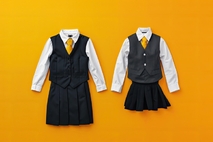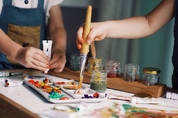My Opinion
전체기사 보기-

Should students study coding in school?
These days, many people say that students should study coding in school. They think coding is important for the future. However, I do not agree with this idea. I believe that not all students need to study coding, and there are better ways to use school time. First, coding is not useful for everyone. Of course, some students may want to become programmers, but most students will choose other jobs. For example, if a student wants to be a teacher, a doctor, or an artist, they do not need to know how to code. For these students, spending too much time on coding is not very helpful. Second, school
-

Is Online Learning Better Than Classroom Learning?
In recent years, online learning has become very popular, especially during the COVID-19 pandemic. Many students experienced both online and classroom learning. But is online learning really better than learning in a classroom? I think both styles have advantages and disadvantages. Let’s take a closer look. Pros of Online Learning First, online learning is very flexible. Students can learn from anywhere — at home, at a café, or even while traveling. They can also study at their own pace. If a student doesn’t understand something, they can watch the lesson again. This can help students who need
-

Should students wear school uniforms?
In many schools, students wear uniforms. Some students like wearing them, but others do not. I think students should wear school uniforms, and here are my reasons. First, uniforms make everyone look equal. If students wear different clothes, some may feel bad if they cannot buy expensive clothes. Uniforms help stop this problem because everyone wears the same thing. Second, uniforms save time in the morning. We do not have to think about what to wear every day. We can get ready for school faster. It also helps us focus on studying, not on clothes. Third, uniforms make students look neat and he
-

Should students wear school uniforms?
In many schools, students wear uniforms. Some students like wearing them, but others do not. I think students should wear school uniforms, and here are my reasons. First, uniforms make everyone look equal. If students wear different clothes, some may feel bad if they cannot buy expensive clothes. Uniforms help stop this problem because everyone wears the same thing. Second, uniforms save time in the morning. We do not have to think about what to wear every day. We can get ready for school faster. It also helps us focus on studying, not on clothes. Third, uniforms make students look neat and he
- 관리자 기자
- 2025-06-10 01:00
-

Should Students Have More Art and Music Classes?
I believe that students should have more art and music classes in school. These classes are not only fun but also help us in many ways. First, art and music help us be more creative. In other subjects like math or science, we usually follow rules. But in art and music, we can express our own ideas and feelings. This helps us think in new ways and become more creative people. Second, these classes help us relax and enjoy school more. Sometimes, studying many subjects can be stressful. When we draw, paint, or play music, we can feel happy and calm. It gives us a break and makes school life more
- 관리자 기자
- 2025-06-10 00:57
-

Why I Think Recycling Is Important
We throw away many things every day. Some of this trash can hurt the Earth. That is why I think recycling is very important. If more people recycle, we can help the planet. First, recycling helps reduce trash. If we do not recycle, all the garbage goes to landfills. These landfills take up a lot of space. If we recycle paper, plastic, and cans, we can make less trash. Then, there will be more clean places for animals and people. Second, recycling saves natural resources. When we recycle paper, we do not need to cut down so many trees. When we recycle cans and plastic, we save metal and oil. Th
- 관리자 기자
- 2025-06-10 00:53
-

Should We Have More Trees in Our School?
Many students spend a lot of time at school. We study, play, and meet friends there. For this reason, it is important to make our school a better place. One way to do this is by planting more trees. In my opinion, we should have more trees in our school for several good reasons. First, trees help make the air cleaner. Trees take in carbon dioxide and give us oxygen. If we plant more trees, the air around our school will be fresher and healthier. This is especially important in cities where there is a lot of air pollution. Breathing clean air helps students concentrate better and feel more comf
- 관리자 기자
- 2025-06-10 00:46
-

Should We Stop Using Plastic Bags?
These days, many people are talking about protecting the environment. One important topic is whether we should stop using plastic bags. In my opinion, we should try to stop using them and find better alternatives. Here are my reasons. First, plastic bags are very harmful to nature. They do not break down easily. When people throw them away, they stay in the environment for hundreds of years. Many plastic bags end up in the ocean, where they hurt sea animals. Fish, turtles, and birds often mistake plastic for food, and this can make them sick or even kill them. If we stop using plastic bags, we
- 관리자 기자
- 2025-06-10 00:43
-
 Entertainment · Broadcasting
Fair Play Menarini International Award, 29th Award Ceremony marked by waves of emotion
Entertainment · Broadcasting
Fair Play Menarini International Award, 29th Award Ceremony marked by waves of emotion
-
 Entertainment · Broadcasting
The Rose, the first Korean band to perform at Coachella, confirms Seoul concert on August 30 for “Once Upon a WRLD”
Entertainment · Broadcasting
The Rose, the first Korean band to perform at Coachella, confirms Seoul concert on August 30 for “Once Upon a WRLD”
-
 Culture · Events
Incheon Port Authority kicks off the 6th Incheon International Marine Forum in Songdo, Incheon, to look into the future of the global marine industry
Culture · Events
Incheon Port Authority kicks off the 6th Incheon International Marine Forum in Songdo, Incheon, to look into the future of the global marine industry
-
 Culture · Events
Seocho Symphony Orchestra to hold performances in Berlin, Germany, and London, England, commemorating the 80th anniversary of liberation and the 75th anniversary of the Korean War
Culture · Events
Seocho Symphony Orchestra to hold performances in Berlin, Germany, and London, England, commemorating the 80th anniversary of liberation and the 75th anniversary of the Korean War
-
 Culture · Events
Gyeonggi Province to hold its largest job fair for middle-aged and older workers on the 9th. 1,000 jobs to be filled.
Culture · Events
Gyeonggi Province to hold its largest job fair for middle-aged and older workers on the 9th. 1,000 jobs to be filled.
-
 International
Jeju's soul resonates in Rome... Singing of the pain and reconciliation of Jeju 4·3
International
Jeju's soul resonates in Rome... Singing of the pain and reconciliation of Jeju 4·3
-
 International
Seoul City establishes a foothold for K-Beauty and fashion to enter the European market, promoting Milan as a base
International
Seoul City establishes a foothold for K-Beauty and fashion to enter the European market, promoting Milan as a base
-
 Medical · Health
Korean Centers for Disease Control and Prevention: Increase in hand, foot, and mouth disease among infants and young children! Follow preventive measures and maintain good hygiene to stay healthy.
Medical · Health
Korean Centers for Disease Control and Prevention: Increase in hand, foot, and mouth disease among infants and young children! Follow preventive measures and maintain good hygiene to stay healthy.
-
 Medical · Health
Korean Centers for Disease Control and Prevention: Injured patients account for the largest proportion of hospitalized patients; falls are the main cause
Medical · Health
Korean Centers for Disease Control and Prevention: Injured patients account for the largest proportion of hospitalized patients; falls are the main cause
-
 Medical · Health
WHO and international health experts visit Wanju local food production sites
Medical · Health
WHO and international health experts visit Wanju local food production sites
오피니언
-
Seong Ki-sun's Book Launch Event ‘Education in Turmoil’...Seeking Hope for Public Education Through Basic, Relationship, Growth (BRG)
On the 6th, the publication celebration for Professor Sung Ki-sun's (Catholic University of Korea, former President of the Korea Institute for Curriculum and Evaluation) book ‘Educational Turmoil’ was held at the Gyeonggi University Teleconvention Center. Sung was the 2022 Democratic Progressive Single Candidate for Gyeonggi Superintendent of Education. The event was a great success, attended by approximately 800 key figures from education, politics, academia, civic groups, and the public. Attendees included Gyeonggi Province Governor Kim Dong-yeon, Bucheon Mayor Cho Yong-ik, former Minister o
-
JP EDU - Hidden Opportunities in Japan: English-Taught International Studies Programs Open Doors to Prestigious Universities
Can you enter a top Japanese university without speaking Japanese? Can you enter a top Japanese university without speaking Japanese? Surprisingly, the answer is yes. Much like Korea’s Yonsei University Underwood International College or the Songdo Global Campus, more than 40 Japanese universities now offer full-degree programs conducted entirely in English. These English-taught programs—often called G30 programs—are especially popular in the field of International Studies. Admission is based on a student’s academic record (GPA) and English proficiency, rather than Japanese language ability. A
-
2026 대한민국영어신문 주니어 영어 기자단 모집
2026 대한민국영어신문 주니어 영어기자단 모집 안내영어로 세상을 보고, 글로 성장하는 주니어 기자단! 1. 모집 대상 모집 인원: 총 00명 한정 모집 지원 자격: 초등학교 2학년 ~ 고등학교 2학년 학생 및 동일연령 청소년 (영어에 관심이 있고, 글쓰기와 인터뷰 활동에 도전하고 싶은 학생 누구나) 2. 활동 내용 영어신문 기자로서 기사 작성, 인터뷰, 취재, 콘텐츠 기획 참여 온라인 영어 학습 콘텐츠 무료 제공 및 기사 첨삭 지도를 통한 영어 실력 향상 정기 영어 특강, 현장 캠프, 멘토링, 전문가 영어학습 컨설팅 제공 작성한 기사는 대한민국영어신문 공식 온라인 플랫폼에 게재 3. 혜택 및 특전 영어기자증 발급 및 임명식 진행 우수기자 시상 및 특전 제공 1:1 기사첨삭 및 학습 피드백 온라인 영어 학습 콘텐츠 무료 제공 연간 36회 이상 기사 게재 기회 부여 -> 공식 칼럼 섹션 제공 4. 모집 일정 신청 기간: 2025년 1월 2일(금)부터 신청 방법: 1) 대한민국영어신문 홈페이지 온라인 폼 신청 * 아래 링크 클릭 기자단 신청 링크 (클릭!!!) 2) 영문 자기소개서(양
-
Lotte Scholarship Foundation Provides 300 Job Seekers with 300 Million Won in Scholarships and Employment Training Support
The Lotte Scholarship Foundation (Chairwoman Jang Hye-seon) held the “Shin Kyuk-ho Lotte Scholarship Award Ceremony for Job Seekers” on Tuesday, May 5, at the Lotte Retail Academy in Yeongdeungpo-gu, Seoul, and presented a total of 300 million won in scholarships to 300 job seekers in the media and engineering fields. This year's scholarship recipients will each receive a living expense scholarship of 1 million won, and will also have the opportunity to participate in various job experience education programs to learn about their desired fields and develop their expertise. The education progra
-
2026-01-29 23:44
11
-
2026-01-28 23:36
No. 6 Reporter
-
2025-12-09 14:30
Seong Ki-sun's Book Launch Event ‘Education in Turmoil’...Seeking Hope for Public Education Through Basic, Relationship, Growth (BRG)
-
2025-11-04 13:48
JP EDU - Hidden Opportunities in Japan: English-Taught International Studies Programs Open Doors to Prestigious Universities
-
2025-10-27 11:03
2026 대한민국영어신문 주니어 영어 기자단 모집
























